It looks like you're using an Ad Blocker.
Please white-list or disable AboveTopSecret.com in your ad-blocking tool.
Thank you.
Some features of ATS will be disabled while you continue to use an ad-blocker.
7
share:
One of the most common arguments I hear when discussing environmental issues is the “what can I do to save the environment?” question. And this is
not a genuine request for information on how to be green but a cry of exasperation! A statement of “what’s the point”
I can see why. We are so often told about climate change, melting ice caps in faraway lands, desertification in Africa, loss of biodiversity in the Amazon... the problem is so massive it can seem daunting. This is something I discussed once before in one of my old threads Think local, not Global
In this thread I wanted to address the issue of the constant media bombardment of massive problems with grandiose schemes to fix them. This approach takes the responsibility away from us and encourages environmental apathy by making us reliant on governments, corporate and organisations.
Another common argument (especially on ATS) is the one that bounces the ball back into the court of the person who passionate about environmental issues. This is done by asking the question... “what have YOU done to save the environment?” this is normally accompanied by statements of how everything you do harms the environment and how the computer that you are typing on is made of plastic and metals etc...
As far as I am concerned this is nothing but an attempt at deflection... batting away the problem by stating the obvious... Yes the computer that I am typing on was created using techniques that damage the environment... but is it as simplistic as that?? Should that be the end of the debate “oh ok, you’re right, my computer harmed the environment so let’s just give up on the environment and do whatever we want with no regard for the negative effects”
So... after hearing these arguments used time and time again I thought I would create a thread to show what I have done to try and minimise my footprint on this world.
It wasn’t so long ago (maybe 15 years) that I was nothing more than an armchair environmentalist... Getting angry on forums while still being part of the problem. I first started taking an interest in the environment as a child... not sure why... no great revelation or anything like that... I just seemed to care and have an interest for nature. But for years I simply moaned about the environment. I still ate fast food, wanted the latest gadgets, purchased items without giving thought to their creation. I guess you could argue that I was a hypocrite... but I would disagree... I was merely in the early stages of environmentalism. And it is the reason I do not judge others that are “armchair environmentalist” The first change that everyone has to make is the change within themselves... and I see the armchair guys as just that, taking the first steps of change. They also provide another crucial role, that of “spreading the word”... helping to get the topic out in the open and discussed rather than being ignored.
Time has moved on since then and I figured that maybe I should share with ATS the changes my family and i have made. I would consider myself to be in the middle stage of my own personal environmental revolution... I will share what I have done and what my future plans are. And maybe, just maybe, it will help some of your personal revolutions. Or maybe some of you will have ideas on how I can do things better.
When we first made the decision to start acting rather than just talking the first thing we did was boycott certain things. Fast food was the first.
Food production techniques is a major factor in environmental degradation around the world... vast swathes of forest destroyed, mono-culture farming, chemicals and fertilisers etc... all of this is encouraged by fast food and convenience food. Not only did reducing these help the environment but it also helps with your personal health. However, this alone was not enough... so we also decided to boycott out of season imported foods. If we are going to have food that is out of season we look for food that was grown in Britain and then frozen, tinned or pickled. If you live in Britain and are enjoying fresh strawberries in February the likelihood is that they have been shipped in from abroad.
After this we decided to stop replacing things that are not broken. Mobile phones, cameras, computers, TVs etc.. are often replaced even though they have many more years of use left in them. Replaced simply because they are either out of fashion or cannot perform the latest craze! So... we keep all of our gadgets until they are no longer fit for purpose... to give you an example my Video camera takes cassettes and my phone is... er... I don’t actually know the model... but this is what it looks like...

Obviously we became more energy conscious too. We make a point of ensuring that lights, which are not in use, are switched off. We do not leave the TV or the computer on when not in use. We do not leave the heating on when we are out. Mobile phone chargers are unplugged once they have finished charging.
It always amazes me how so many people complain about energy costs but will have almost every light on in their home. I remember being a child and my father going nuts once because I‘d left the bathroom light on after going to the toilet. We could barely afford the electric bill and leaving lights on was not an option. And this was in the days before mobile phones, computers, dishwashers, computers, games consoles and all the other power hungry gadgets and utilities we now take for granted.
The next thing we did was a very simple one... we all decided to spend far more time in the outdoors. Walks in the forest, more time in the garden, take the kids to the park more, visits to our local garden centre, I started gardening.... We also decided to not let the weather become the deciding factor of if we should go out of not. There are four glorious seasons in Britain... sadly most people only ever venture out during one of them and, as amazing as summer may be, we have found that autumn, winter and spring offer just as much in the way of beauty (even if you do have to wrap up) Rain, sleet and snow do not stop us.
This may not sound like much but the more time we spent outdoors the less time we spent in front of power hungry gadgets; namely, TV’s, game consoles and computers!
Once again, this not only benefits the environment but also our own health and that of our children. Our kids are exercising their legs instead of their thumbs. Their brains are being filled with the wonders of nature instead of the programming of TV.
Our next decision was to start buying second hand whenever we could. We also started excepting hand-me-downs we once would have turned away. People buy clothes for their children which are often out grown long before they have turned to rags. Often these clothes are thrown out rather than recycled or passed down to other kids. There is an element of snobbery regarding second hand clothes which is quite ridiculous. Clothes in Britain have become ridiculously cheap thanks to stores like Primark and Matalan. This is great for family’s on a budget but unfortunately it has also help sustain a throw away culture in Britain. People (especially young people) often seeking the latest fashion and trends will think nothing of wearing a garment once or twice before replacing it with something newer.
TBC...
I can see why. We are so often told about climate change, melting ice caps in faraway lands, desertification in Africa, loss of biodiversity in the Amazon... the problem is so massive it can seem daunting. This is something I discussed once before in one of my old threads Think local, not Global
In this thread I wanted to address the issue of the constant media bombardment of massive problems with grandiose schemes to fix them. This approach takes the responsibility away from us and encourages environmental apathy by making us reliant on governments, corporate and organisations.
Another common argument (especially on ATS) is the one that bounces the ball back into the court of the person who passionate about environmental issues. This is done by asking the question... “what have YOU done to save the environment?” this is normally accompanied by statements of how everything you do harms the environment and how the computer that you are typing on is made of plastic and metals etc...
As far as I am concerned this is nothing but an attempt at deflection... batting away the problem by stating the obvious... Yes the computer that I am typing on was created using techniques that damage the environment... but is it as simplistic as that?? Should that be the end of the debate “oh ok, you’re right, my computer harmed the environment so let’s just give up on the environment and do whatever we want with no regard for the negative effects”
So... after hearing these arguments used time and time again I thought I would create a thread to show what I have done to try and minimise my footprint on this world.
It wasn’t so long ago (maybe 15 years) that I was nothing more than an armchair environmentalist... Getting angry on forums while still being part of the problem. I first started taking an interest in the environment as a child... not sure why... no great revelation or anything like that... I just seemed to care and have an interest for nature. But for years I simply moaned about the environment. I still ate fast food, wanted the latest gadgets, purchased items without giving thought to their creation. I guess you could argue that I was a hypocrite... but I would disagree... I was merely in the early stages of environmentalism. And it is the reason I do not judge others that are “armchair environmentalist” The first change that everyone has to make is the change within themselves... and I see the armchair guys as just that, taking the first steps of change. They also provide another crucial role, that of “spreading the word”... helping to get the topic out in the open and discussed rather than being ignored.
Time has moved on since then and I figured that maybe I should share with ATS the changes my family and i have made. I would consider myself to be in the middle stage of my own personal environmental revolution... I will share what I have done and what my future plans are. And maybe, just maybe, it will help some of your personal revolutions. Or maybe some of you will have ideas on how I can do things better.
When we first made the decision to start acting rather than just talking the first thing we did was boycott certain things. Fast food was the first.
Food production techniques is a major factor in environmental degradation around the world... vast swathes of forest destroyed, mono-culture farming, chemicals and fertilisers etc... all of this is encouraged by fast food and convenience food. Not only did reducing these help the environment but it also helps with your personal health. However, this alone was not enough... so we also decided to boycott out of season imported foods. If we are going to have food that is out of season we look for food that was grown in Britain and then frozen, tinned or pickled. If you live in Britain and are enjoying fresh strawberries in February the likelihood is that they have been shipped in from abroad.
After this we decided to stop replacing things that are not broken. Mobile phones, cameras, computers, TVs etc.. are often replaced even though they have many more years of use left in them. Replaced simply because they are either out of fashion or cannot perform the latest craze! So... we keep all of our gadgets until they are no longer fit for purpose... to give you an example my Video camera takes cassettes and my phone is... er... I don’t actually know the model... but this is what it looks like...

Obviously we became more energy conscious too. We make a point of ensuring that lights, which are not in use, are switched off. We do not leave the TV or the computer on when not in use. We do not leave the heating on when we are out. Mobile phone chargers are unplugged once they have finished charging.
It always amazes me how so many people complain about energy costs but will have almost every light on in their home. I remember being a child and my father going nuts once because I‘d left the bathroom light on after going to the toilet. We could barely afford the electric bill and leaving lights on was not an option. And this was in the days before mobile phones, computers, dishwashers, computers, games consoles and all the other power hungry gadgets and utilities we now take for granted.
The next thing we did was a very simple one... we all decided to spend far more time in the outdoors. Walks in the forest, more time in the garden, take the kids to the park more, visits to our local garden centre, I started gardening.... We also decided to not let the weather become the deciding factor of if we should go out of not. There are four glorious seasons in Britain... sadly most people only ever venture out during one of them and, as amazing as summer may be, we have found that autumn, winter and spring offer just as much in the way of beauty (even if you do have to wrap up) Rain, sleet and snow do not stop us.
This may not sound like much but the more time we spent outdoors the less time we spent in front of power hungry gadgets; namely, TV’s, game consoles and computers!
Once again, this not only benefits the environment but also our own health and that of our children. Our kids are exercising their legs instead of their thumbs. Their brains are being filled with the wonders of nature instead of the programming of TV.
Our next decision was to start buying second hand whenever we could. We also started excepting hand-me-downs we once would have turned away. People buy clothes for their children which are often out grown long before they have turned to rags. Often these clothes are thrown out rather than recycled or passed down to other kids. There is an element of snobbery regarding second hand clothes which is quite ridiculous. Clothes in Britain have become ridiculously cheap thanks to stores like Primark and Matalan. This is great for family’s on a budget but unfortunately it has also help sustain a throw away culture in Britain. People (especially young people) often seeking the latest fashion and trends will think nothing of wearing a garment once or twice before replacing it with something newer.
TBC...
edit on 13-6-2012 by Muckster because: (no reason given)
edit on 13-6-2012 by Muckster because: (no reason
given)
Another step that we took is to ensure that, when we do buy new clothes, we purchase natural fibre clothes. We try to avoid Nylons and polyesters.
These are made from non-biodegradable petrochemicals as well as being energy hungry, in the manufacturing process, and create nitrous oxide.
Instead we try to aim for cottons and wool. More expensive, yes, but often warmer, dry quicker when wet, allow the body to breath and are biodegradable.
Now cotton has its problems too. Cotton production often produced with the intensive use of pesticides. But at least when its shelf life is over it breaks back down into the earth and doesn’t cause micro plastic pollution
Another thing that we do is recycle. We are fortunate enough to live in a borough that takes recycling seriously. We have a large green bin for landfill waste... items that go in this are normally things that cannot be recycled... plastic wrapping from consumables, plastic carrier bags etc... Then we have a big brown bin for green waste (bones, tea bags, grass cuttings etc...) and finally we have three separate boxes for Glass, paper, Tin and certain plastics. We rarely fill up the landfill bin because we recycle almost everything. It’s no drama, I have a large bin in my garden which we fill with all the recyclable throughout the week and then, once a week, I spend 20 minutes sorting through it all and separating them into their individual containers.
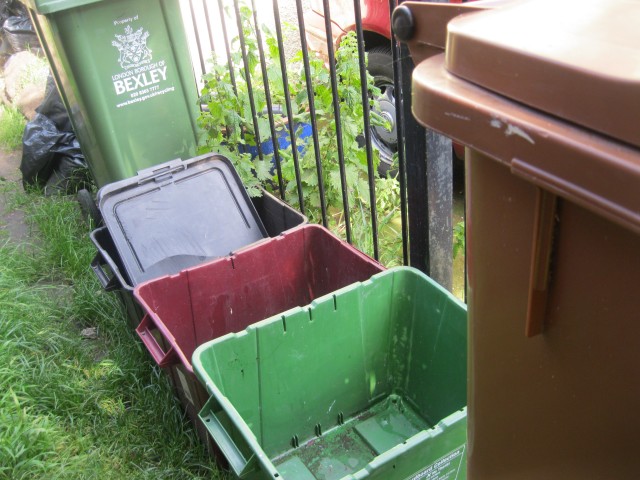
The next step was slightly bigger... we decided to dedicate a portion of our garden to growing our own vegetables. Many of the vegetables in the supermarket a produced using harmful techniques. We only have a small garden and certainly do not have enough land to become anywhere near self sufficient. However, we can limit our impact by growing our own. And for such a small plot we do very well. We are currently growing Strawberrie, Carrots, Cabbage, Spinach, Brussels, Runner beans, Peas, Lettuce, Beetroot, Tomatos, Courgette, pickling cucumber, pumpkin, Chillies, Basil, Rosemary, Thyme, mint, bay, coriander, onions....hmm... cant think of anything else... But thats a hell of a lot for a small 30tf garden. We have achieved this by thinking outside the box and utilising areas that people wouldnt always consider... For example I made veg boxes that I can hang off the fence...
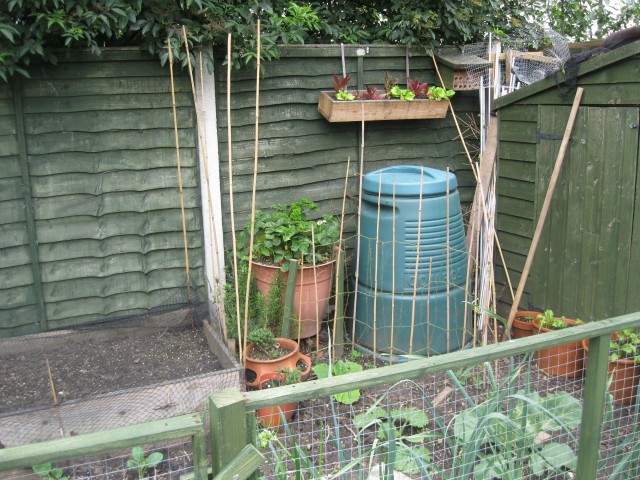
I grow Basil in pot on our kitchen window cill
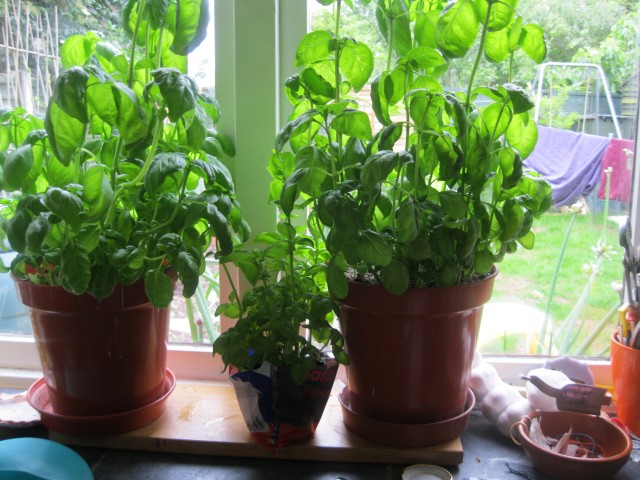
We grow Coriander, Aloe Vera, Basil and French thyme in our conservatory
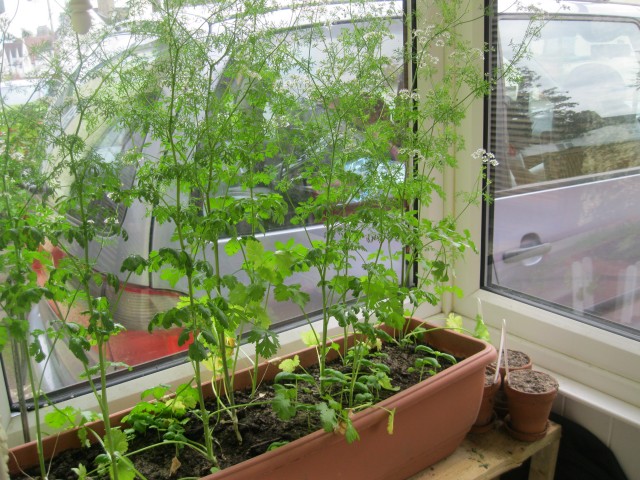
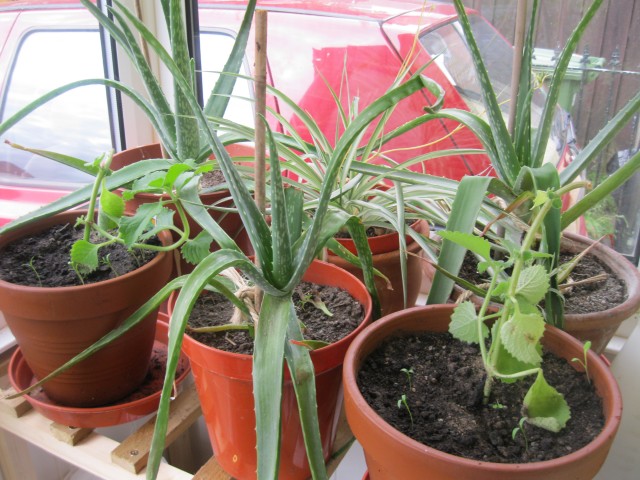
We grow Tomatoes up on our flat roof (which I have to get to using a ladder)
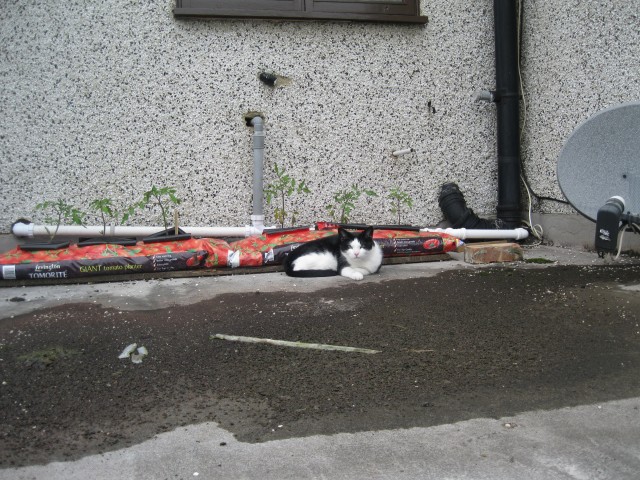
Infact, anywhere that there is space and sunlight I use for growing.
Now of course it would be pointless growing all this veg if I was shipping in compost, spraying chemicals and using un-natural fertilisers and plant food. We are completely organic and make our own compost...
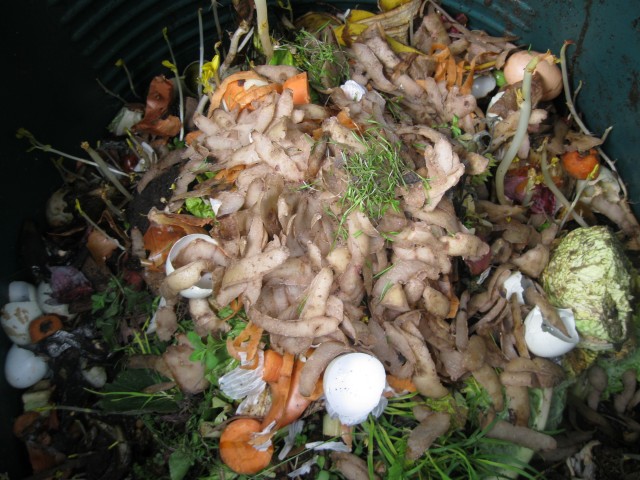
We also make our own plants food by growing Comfrey and making comfrey tea as well as Nettle Tea
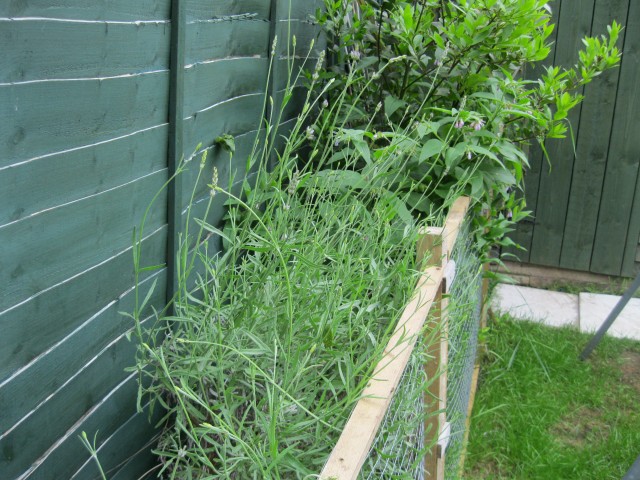
And we keep the bugs down by a mixture of hardwork, companion planting and encouraging natural predators into the garden. It is also worth noting that every single plant in our garden is either edible or has a practical use.
Once our veg patch was established we decided to take it to the next level. Meat and Eggs is another consideration for anyone who is serious about animal welfare and the environment. Chickens are often kept in terrible conditions and are energy intensive due to lighting, heating during rearing and hatching. That’s not to mention the shipping and packaging. So we got ourselves some chickens. We now have fresh organic eggs everyday along with the occasional roast chicken. Also, during the autumn, the chicken are allowed onto the veg patch where they kindly remove all the pests and unwanted weed seeds that are preparing to overwinter till spring.
Our chicken coop was a second hand garden shed from eBay which I converted by adding nest boxes and pop hole.
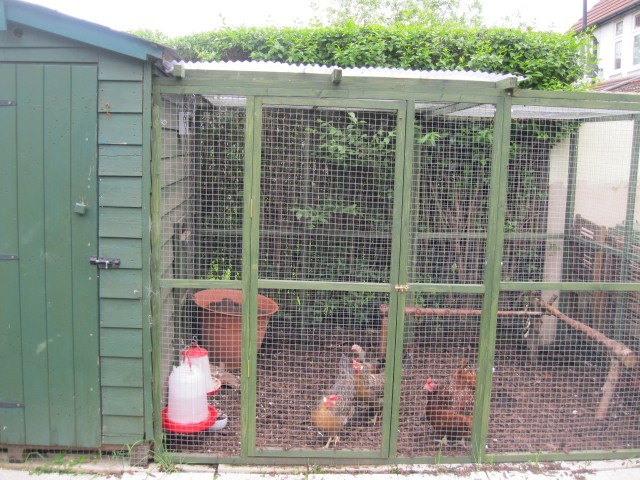
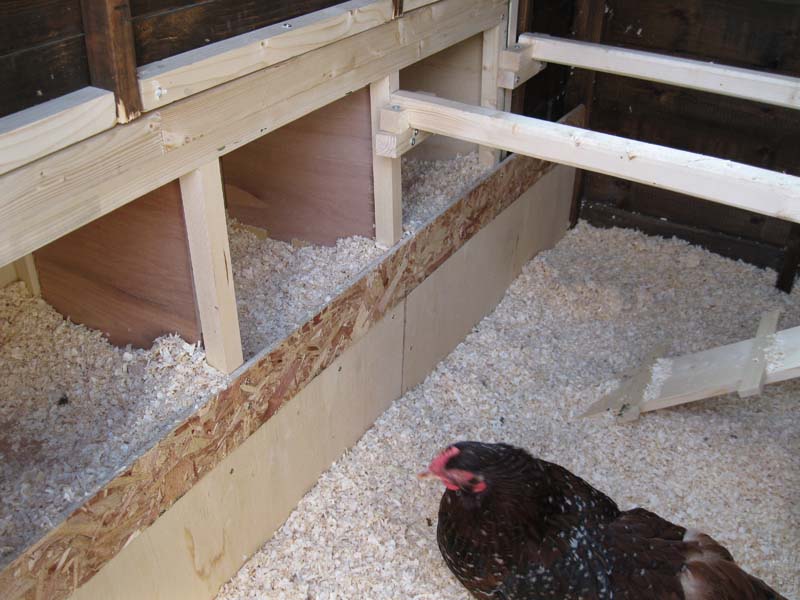
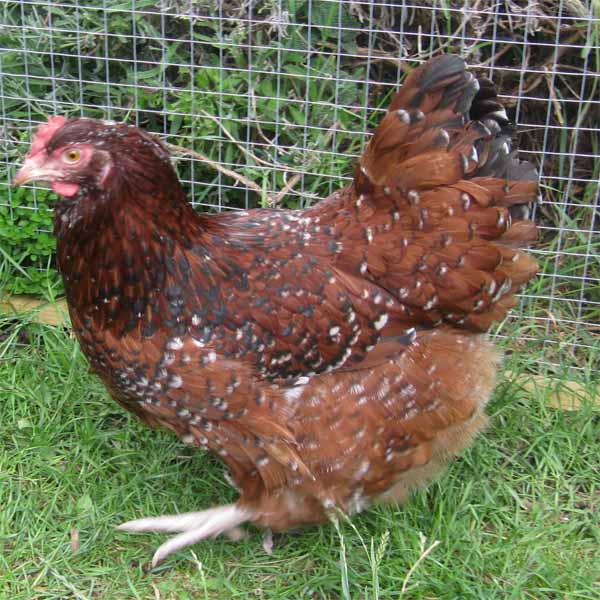
A thread I started on The benefits of keeping chickens
TBC
Instead we try to aim for cottons and wool. More expensive, yes, but often warmer, dry quicker when wet, allow the body to breath and are biodegradable.
Now cotton has its problems too. Cotton production often produced with the intensive use of pesticides. But at least when its shelf life is over it breaks back down into the earth and doesn’t cause micro plastic pollution
Another thing that we do is recycle. We are fortunate enough to live in a borough that takes recycling seriously. We have a large green bin for landfill waste... items that go in this are normally things that cannot be recycled... plastic wrapping from consumables, plastic carrier bags etc... Then we have a big brown bin for green waste (bones, tea bags, grass cuttings etc...) and finally we have three separate boxes for Glass, paper, Tin and certain plastics. We rarely fill up the landfill bin because we recycle almost everything. It’s no drama, I have a large bin in my garden which we fill with all the recyclable throughout the week and then, once a week, I spend 20 minutes sorting through it all and separating them into their individual containers.

The next step was slightly bigger... we decided to dedicate a portion of our garden to growing our own vegetables. Many of the vegetables in the supermarket a produced using harmful techniques. We only have a small garden and certainly do not have enough land to become anywhere near self sufficient. However, we can limit our impact by growing our own. And for such a small plot we do very well. We are currently growing Strawberrie, Carrots, Cabbage, Spinach, Brussels, Runner beans, Peas, Lettuce, Beetroot, Tomatos, Courgette, pickling cucumber, pumpkin, Chillies, Basil, Rosemary, Thyme, mint, bay, coriander, onions....hmm... cant think of anything else... But thats a hell of a lot for a small 30tf garden. We have achieved this by thinking outside the box and utilising areas that people wouldnt always consider... For example I made veg boxes that I can hang off the fence...

I grow Basil in pot on our kitchen window cill

We grow Coriander, Aloe Vera, Basil and French thyme in our conservatory


We grow Tomatoes up on our flat roof (which I have to get to using a ladder)

Infact, anywhere that there is space and sunlight I use for growing.
Now of course it would be pointless growing all this veg if I was shipping in compost, spraying chemicals and using un-natural fertilisers and plant food. We are completely organic and make our own compost...

We also make our own plants food by growing Comfrey and making comfrey tea as well as Nettle Tea

And we keep the bugs down by a mixture of hardwork, companion planting and encouraging natural predators into the garden. It is also worth noting that every single plant in our garden is either edible or has a practical use.
Once our veg patch was established we decided to take it to the next level. Meat and Eggs is another consideration for anyone who is serious about animal welfare and the environment. Chickens are often kept in terrible conditions and are energy intensive due to lighting, heating during rearing and hatching. That’s not to mention the shipping and packaging. So we got ourselves some chickens. We now have fresh organic eggs everyday along with the occasional roast chicken. Also, during the autumn, the chicken are allowed onto the veg patch where they kindly remove all the pests and unwanted weed seeds that are preparing to overwinter till spring.
Our chicken coop was a second hand garden shed from eBay which I converted by adding nest boxes and pop hole.



A thread I started on The benefits of keeping chickens
TBC
edit on 13-6-2012 by Muckster because: (no reason given)
Our most recent goal is to reduce the amount of plastic we use in the garden. Plant pots, watering cans, nylon netting, netting pegs, garden tools,
etc... are all made using plastics. So, whenever one of these items break, we replace them with either wood, metal or clay. Now I do realise that
there is a certain amount of environmental destruction involved in the production of anything... but again the point is about shelf life and an items
ability to biodegrade.
For example plastic plant pots start to go brittle and break down after a couple of seasons... but clay pots (if looked after and not dropped) will last for ages.
Our metal watering can replaced our broken plastic one... more expensive but lasts longer..
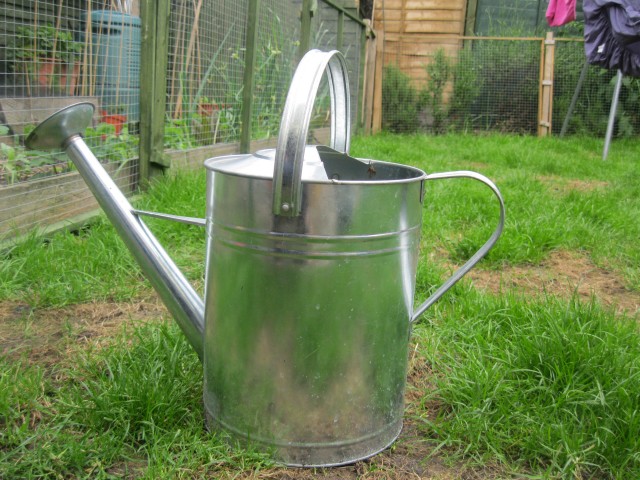
Some of our clay pots
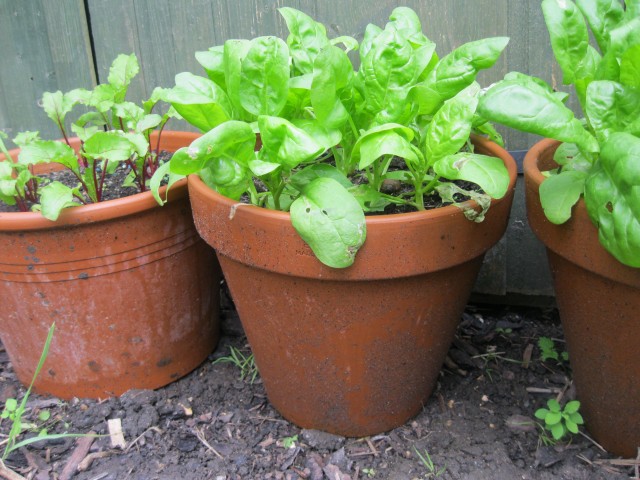
Other things i will mention...
We do not buy Hybrid seeds, make our own jams and pickles er... im sure there more but you get the point.
With just a small garden, some time and effort, i believe we have achieved a fair amount. This is not meant to be gloating or a "look at how great we are" thread because we are not. We still have a long way to go and we are now planning for our future.
Our next step is to buy some land and try and get as close to self sufficient as possible. I know thats not for everyone... but i am sure that everyone can do many of things that i have listed on here. May not be perfect but its a start.
Hope you enjoyed...
Peace
oh... btw... sorry if there is spelling mistakes or typos... kind of in a rush
For example plastic plant pots start to go brittle and break down after a couple of seasons... but clay pots (if looked after and not dropped) will last for ages.
Our metal watering can replaced our broken plastic one... more expensive but lasts longer..

Some of our clay pots

Other things i will mention...
We do not buy Hybrid seeds, make our own jams and pickles er... im sure there more but you get the point.
With just a small garden, some time and effort, i believe we have achieved a fair amount. This is not meant to be gloating or a "look at how great we are" thread because we are not. We still have a long way to go and we are now planning for our future.
Our next step is to buy some land and try and get as close to self sufficient as possible. I know thats not for everyone... but i am sure that everyone can do many of things that i have listed on here. May not be perfect but its a start.
Hope you enjoyed...
Peace
oh... btw... sorry if there is spelling mistakes or typos... kind of in a rush
edit on 13-6-2012 by Muckster because: (no reason
given)
Really good thread mate, but I think focus needs to be put on urban living.
Keep in mind, most people live in somewhat cramped areas, not to mention a global audience.
Some things I would personally add to this list is over time purchasing solar panels..advanced good ones whenever the money frees up a bit...over years (or decades) it will pay off and slowly start reducing your footprint.
Ultimately technology will be the thing that brings us out of this disaster...so a call to a congressman to fund furthering green technologies may be overall more important than turning out a light (but do both).
Keep in mind, most people live in somewhat cramped areas, not to mention a global audience.
Some things I would personally add to this list is over time purchasing solar panels..advanced good ones whenever the money frees up a bit...over years (or decades) it will pay off and slowly start reducing your footprint.
Ultimately technology will be the thing that brings us out of this disaster...so a call to a congressman to fund furthering green technologies may be overall more important than turning out a light (but do both).
Very informative and interesting thread, I am always looking into ways I can reduce our footprint.
We live in a top floor flat and only have a shared communal garden that we cannot use (Because if the landlord)
BUT, we do have a balcony! I have started to grow what I can with this small space Potatoes, Sweetcorn, Peas, Carrots, and a selection of herbs.
We also recycle as much of our rubbish as possible.
Buying second hand is a great thing to do also, which I do where possible! Always works out cheaper and is much better for the environment!
We live in a top floor flat and only have a shared communal garden that we cannot use (Because if the landlord)
BUT, we do have a balcony! I have started to grow what I can with this small space Potatoes, Sweetcorn, Peas, Carrots, and a selection of herbs.
We also recycle as much of our rubbish as possible.
Buying second hand is a great thing to do also, which I do where possible! Always works out cheaper and is much better for the environment!
Originally posted by SaturnFX
Really good thread mate, but I think focus needs to be put on urban living.
Keep in mind, most people live in somewhat cramped areas, not to mention a global audience.
Some things I would personally add to this list is over time purchasing solar panels..advanced good ones whenever the money frees up a bit...over years (or decades) it will pay off and slowly start reducing your footprint.
Ultimately technology will be the thing that brings us out of this disaster...so a call to a congressman to fund furthering green technologies may be overall more important than turning out a light (but do both).
Thanks SaturnFX
I know the photos may be a little deceiving, but i do actually live in an urban area... i live just outside Dartford (in Kent) in a small 3 bedroom house and, not sure if you know the area, it is very built up. But i see your point... not everyone has the luxury of even a small garden. But that is one of the reason why i showed the pics of the Basil in my kitchen... all you need is a window and you can grow some food
You are also right about the solar panels... we haven’t invested in them yet mainly, because we are currently looking for land. Once we have moved it will become a priority for us. The reason i highlight turning our lights is because, for those who cannot afford Solar, or do not have the right type of roof, it is a worthwhile discipline.
Peace
edit on 13-6-2012 by Muckster because: (no reason given)
Originally posted by mojojojo
Very informative and interesting thread, I am always looking into ways I can reduce our footprint.
We live in a top floor flat and only have a shared communal garden that we cannot use (Because if the landlord)
BUT, we do have a balcony! I have started to grow what I can with this small space Potatoes, Sweetcorn, Peas, Carrots, and a selection of herbs.
We also recycle as much of our rubbish as possible.
Buying second hand is a great thing to do also, which I do where possible! Always works out cheaper and is much better for the environment!
Thanks mojojojo
It is amazing how much you can grow in a small space and it sound like you are doing great You can also grow tomatoes in upside-down pots which you can hang above your balcony... these can be very productive
Peace
edit on 13-6-2012 by Muckster because: (no reason given)
Nice work there Muckster. Very creative use of space.
I have 3 large beds on the go at the moment in a community garden. It's the first time I've done anything like it, so has been a bit hit and miss. Have had some great lettuce's on the go and quite a few herbs. My peas didn't take though. It is amazing though how quickly you can grown healthy food.
I think when money gets tighter in the future, more people will be turning to this sort of lifestyle. There will be more localism, when it comes to the use of resources and food.
I have 3 large beds on the go at the moment in a community garden. It's the first time I've done anything like it, so has been a bit hit and miss. Have had some great lettuce's on the go and quite a few herbs. My peas didn't take though. It is amazing though how quickly you can grown healthy food.
I think when money gets tighter in the future, more people will be turning to this sort of lifestyle. There will be more localism, when it comes to the use of resources and food.
Originally posted by woodwardjnr
Nice work there Muckster. Very creative use of space.
I have 3 large beds on the go at the moment in a community garden. It's the first time I've done anything like it, so has been a bit hit and miss. Have had some great lettuce's on the go and quite a few herbs. My peas didn't take though. It is amazing though how quickly you can grown healthy food.
I think when money gets tighter in the future, more people will be turning to this sort of lifestyle. There will be more localism, when it comes to the use of resources and food.
Being an organic gardener I have come to except a certain amount of losses as part and parcel of it. Whenever I plant seeds its 4 for me 1 for nature
I also have the occasion failure of an entire crop... this year it was my celery... very poor germination rates and the ones that did germinate didn’t do so well once planted out. I think the extreme wet weather hasn’t helped.
I have been growing veg for a few years now so if you ever have any question feel free to drop me a U2U. I would be more than happy to help if I can
Peace
reply to post by Muckster
Nice one Muckster. You have a great set-up there.
I am a member of the Green Party in the UK and bang on about green issues to friends/family etc.
Things I do? Not a great deal other than recycling, making sure lights, appliances are off when not being used etc. I don't drive.
My dad has installed solar panels on the roof of his house.
Nice one Muckster. You have a great set-up there.
I am a member of the Green Party in the UK and bang on about green issues to friends/family etc.
Things I do? Not a great deal other than recycling, making sure lights, appliances are off when not being used etc. I don't drive.
My dad has installed solar panels on the roof of his house.
Originally posted by Peruvianmonk
reply to post by Muckster
Nice one Muckster. You have a great set-up there.
I am a member of the Green Party in the UK and bang on about green issues to friends/family etc.
Things I do? Not a great deal other than recycling, making sure lights, appliances are off when not being used etc. I don't drive.
My dad has installed solar panels on the roof of his house.
Hey that’s cool, it’s better to bang on about green issues than who won the x-factor or what i-thingy you have
I am interested about your fathers Solar panels... what does he think of them and where did he get them from??
Like i mentioned before, once we move home i will be looking to invest in some
reply to post by Muckster
Awesome thread Muckster ATS needs more like these.
More people need to realize you don't have to become some born again tree-hugging vegan to make a difference. Simply waking ourselves up out of the consumerist coma is an excellent start.
Being more conscientious of what we eat and where it comes from. Buying local. Doing your research and purchasing things that are actually built to last - rather than built long enough to impress the neighbours and then breaking down just in time for the latest version to come out so you can impress them all over again. Biking or walking instead of driving everywhere. Etc.
It's healthy and empowering and infectious and sure beats sitting around eating cheetos ranting about big government wanting to control our lives - while Monsanto, ExxonMobil and Walmart take more and more of our true freedoms away every day we continue to sleepwalk through this madness.
S & F.
Awesome thread Muckster ATS needs more like these.
More people need to realize you don't have to become some born again tree-hugging vegan to make a difference. Simply waking ourselves up out of the consumerist coma is an excellent start.
Being more conscientious of what we eat and where it comes from. Buying local. Doing your research and purchasing things that are actually built to last - rather than built long enough to impress the neighbours and then breaking down just in time for the latest version to come out so you can impress them all over again. Biking or walking instead of driving everywhere. Etc.
It's healthy and empowering and infectious and sure beats sitting around eating cheetos ranting about big government wanting to control our lives - while Monsanto, ExxonMobil and Walmart take more and more of our true freedoms away every day we continue to sleepwalk through this madness.
S & F.
reply to post by mc_squared
Hey thank mate
HAHA - What an excellent summary
Hey thank mate
It's healthy and empowering and infectious and sure beats sitting around eating cheetos ranting about big government wanting to control our lives - while Monsanto, ExxonMobil and Walmart take more and more of our true freedoms away every day we continue to sleepwalk through this madness.
HAHA - What an excellent summary
reply to post by Muckster
The solar panels my dad bought are Photovoltaics (PV). They produce over 2 kilowatts (2000 watts an hour) when the sun is out. This was under the 43p tariff set up by the Labour government, its 21p now.
The solar panels my dad bought are Photovoltaics (PV). They produce over 2 kilowatts (2000 watts an hour) when the sun is out. This was under the 43p tariff set up by the Labour government, its 21p now.
reply to post by Peruvianmonk
I thought that the high court had ruled the cut to 21p as "legally flawed" due to the short notice of the cuts? Due to this i assumed that it had been put back to the 43p tariff. I know that the Government lodged an appeal, which they lost, and had also launched a second, which i do not know the outcome of...
The Government bangs on about helping the environment and meeting targets... well put your money where your mouth is Cameron... or its nothing but greenwash!!
I thought that the high court had ruled the cut to 21p as "legally flawed" due to the short notice of the cuts? Due to this i assumed that it had been put back to the 43p tariff. I know that the Government lodged an appeal, which they lost, and had also launched a second, which i do not know the outcome of...
The Government bangs on about helping the environment and meeting targets... well put your money where your mouth is Cameron... or its nothing but greenwash!!
new topics
-
Paramilitary Leaks - John Williams
Whistle Blowers and Leaked Documents: 2 hours ago -
Some sausage, some chicken, some sauce, some onions and some garlic...and some peppers!
Food and Cooking: 4 hours ago -
Hearing more ambulances lately
Medical Issues & Conspiracies: 4 hours ago -
Los Angeles brush fires latest: 2 blazes threaten structures, prompt evacuations
Mainstream News: 4 hours ago -
House Passes Laken Riley Act
Mainstream News: 5 hours ago -
The more I think about it
General Chit Chat: 5 hours ago -
What Comes After January 20th
Mainstream News: 7 hours ago -
Canada as a state .. how would it work?
General Chit Chat: 7 hours ago -
Those stupid GRAVITE commercials
Rant: 8 hours ago -
Let's Buy Greenland
General Chit Chat: 9 hours ago
top topics
-
House Passes Laken Riley Act
Mainstream News: 5 hours ago, 22 flags -
What Comes After January 20th
Mainstream News: 7 hours ago, 18 flags -
Claim: General Mark Milley Approved Heat and Sound Directed Energy Weapons During 2020 Riots
Whistle Blowers and Leaked Documents: 14 hours ago, 12 flags -
Planned Civil War In Britain May Be Triggered Soon
Social Issues and Civil Unrest: 12 hours ago, 7 flags -
Let's Buy Greenland
General Chit Chat: 9 hours ago, 6 flags -
Those stupid GRAVITE commercials
Rant: 8 hours ago, 5 flags -
Hearing more ambulances lately
Medical Issues & Conspiracies: 4 hours ago, 4 flags -
Los Angeles brush fires latest: 2 blazes threaten structures, prompt evacuations
Mainstream News: 4 hours ago, 4 flags -
The more I think about it
General Chit Chat: 5 hours ago, 4 flags -
Canada as a state .. how would it work?
General Chit Chat: 7 hours ago, 4 flags
active topics
-
Paramilitary Leaks - John Williams
Whistle Blowers and Leaked Documents • 6 • : Lumenari -
Meta Llama local AI system is scary good
Science & Technology • 47 • : glend -
House Passes Laken Riley Act
Mainstream News • 15 • : KrustyKrab -
What Comes After January 20th
Mainstream News • 23 • : Enduro -
-@TH3WH17ERABB17- -Q- ---TIME TO SHOW THE WORLD--- -Part- --44--
Dissecting Disinformation • 3964 • : 777Vader -
Judge rules president-elect Donald Trump must be sentenced in 'hush money' trial
US Political Madness • 58 • : JadedGhost -
Let's Buy Greenland
General Chit Chat • 15 • : BingoMcGoof -
ILLUMINATION: Dimensions / Degrees – Da Vincis Last Supper And The Philosophers Stone
Secret Societies • 20 • : Compendium -
Los Angeles brush fires latest: 2 blazes threaten structures, prompt evacuations
Mainstream News • 9 • : BeyondKnowledge3 -
This is why ALL illegals who live in the US must go
Social Issues and Civil Unrest • 38 • : fringeofthefringe
7
